Support Workers in Social Care
VerifiedAdded on 2020/06/04
|7
|1742
|89
AI Summary
This assignment explores the essential contributions of non-direct care workers within the health and social care sector. It emphasizes their diverse roles, the importance of supervision and management practices to foster positive working relationships, and the necessity of recognizing their value through rewards and appreciation. The analysis aims to demonstrate how improved support for these workers can enhance team operations and overall effectiveness in providing quality care.
Contribute Materials
Your contribution can guide someone’s learning journey. Share your
documents today.
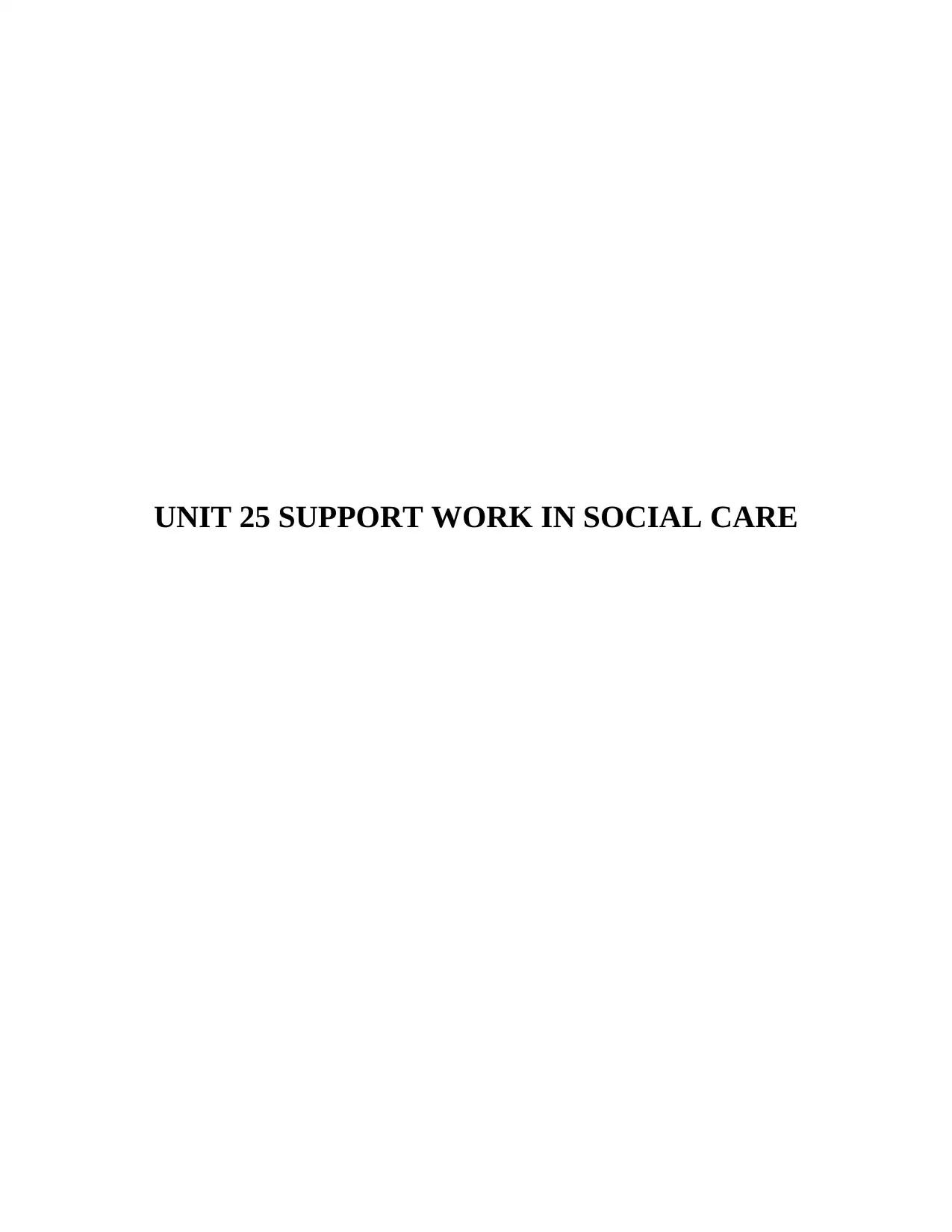
UNIT 25 SUPPORT WORK IN SOCIAL CARE
Secure Best Marks with AI Grader
Need help grading? Try our AI Grader for instant feedback on your assignments.
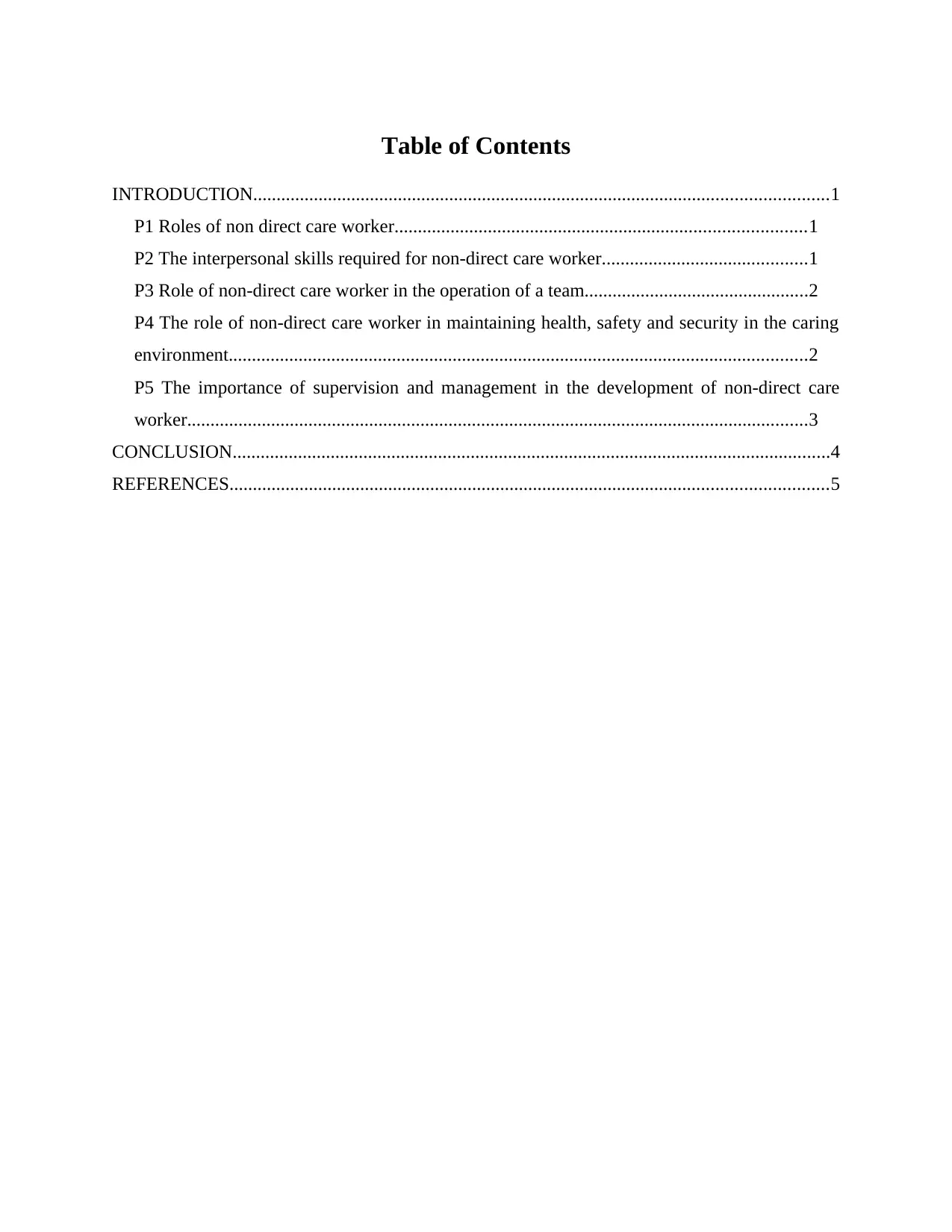
Table of Contents
INTRODUCTION...........................................................................................................................1
P1 Roles of non direct care worker........................................................................................1
P2 The interpersonal skills required for non-direct care worker............................................1
P3 Role of non-direct care worker in the operation of a team................................................2
P4 The role of non-direct care worker in maintaining health, safety and security in the caring
environment............................................................................................................................2
P5 The importance of supervision and management in the development of non-direct care
worker.....................................................................................................................................3
CONCLUSION................................................................................................................................4
REFERENCES................................................................................................................................5
INTRODUCTION...........................................................................................................................1
P1 Roles of non direct care worker........................................................................................1
P2 The interpersonal skills required for non-direct care worker............................................1
P3 Role of non-direct care worker in the operation of a team................................................2
P4 The role of non-direct care worker in maintaining health, safety and security in the caring
environment............................................................................................................................2
P5 The importance of supervision and management in the development of non-direct care
worker.....................................................................................................................................3
CONCLUSION................................................................................................................................4
REFERENCES................................................................................................................................5
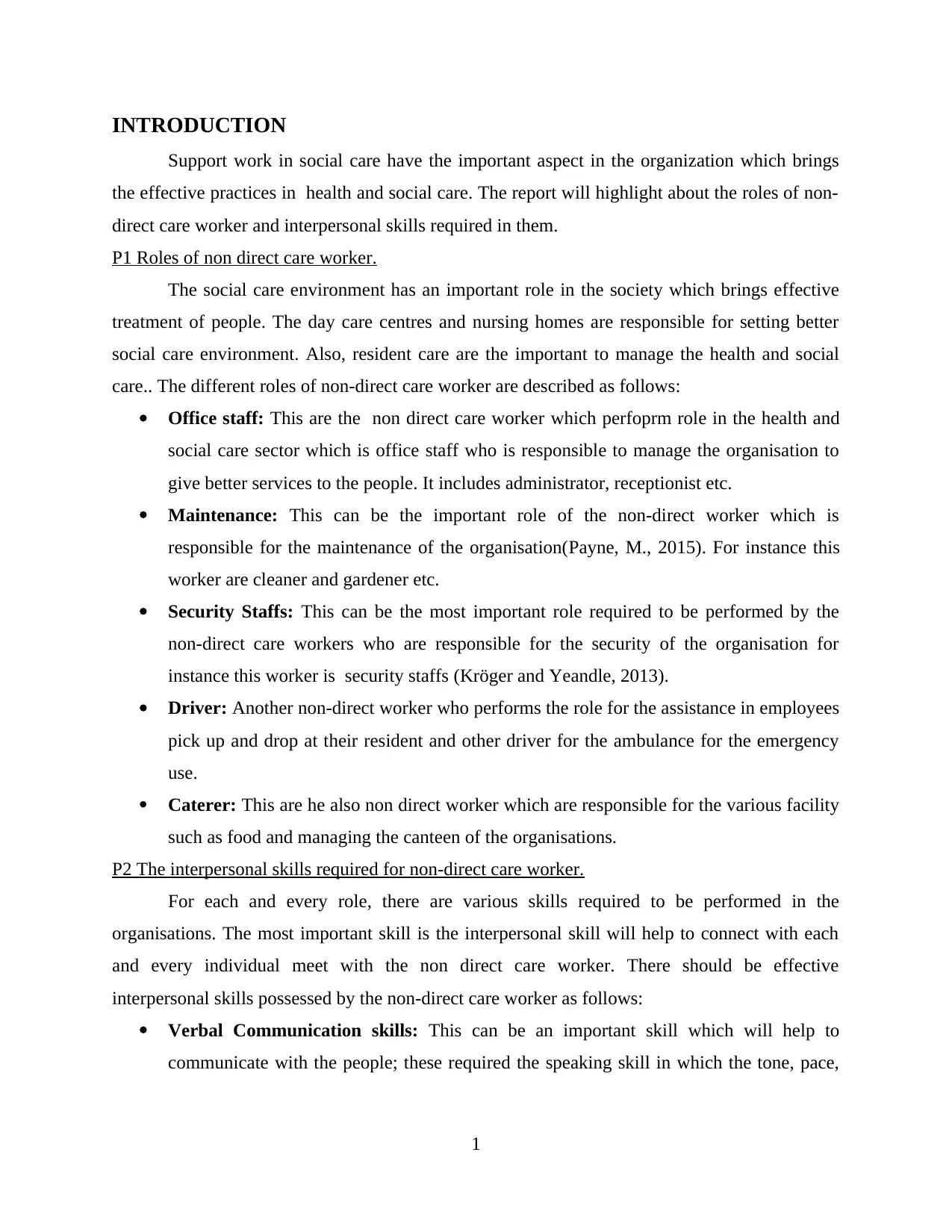
INTRODUCTION
Support work in social care have the important aspect in the organization which brings
the effective practices in health and social care. The report will highlight about the roles of non-
direct care worker and interpersonal skills required in them.
P1 Roles of non direct care worker.
The social care environment has an important role in the society which brings effective
treatment of people. The day care centres and nursing homes are responsible for setting better
social care environment. Also, resident care are the important to manage the health and social
care.. The different roles of non-direct care worker are described as follows:
Office staff: This are the non direct care worker which perfoprm role in the health and
social care sector which is office staff who is responsible to manage the organisation to
give better services to the people. It includes administrator, receptionist etc.
Maintenance: This can be the important role of the non-direct worker which is
responsible for the maintenance of the organisation(Payne, M., 2015). For instance this
worker are cleaner and gardener etc.
Security Staffs: This can be the most important role required to be performed by the
non-direct care workers who are responsible for the security of the organisation for
instance this worker is security staffs (Kröger and Yeandle, 2013).
Driver: Another non-direct worker who performs the role for the assistance in employees
pick up and drop at their resident and other driver for the ambulance for the emergency
use.
Caterer: This are he also non direct worker which are responsible for the various facility
such as food and managing the canteen of the organisations.
P2 The interpersonal skills required for non-direct care worker.
For each and every role, there are various skills required to be performed in the
organisations. The most important skill is the interpersonal skill will help to connect with each
and every individual meet with the non direct care worker. There should be effective
interpersonal skills possessed by the non-direct care worker as follows:
Verbal Communication skills: This can be an important skill which will help to
communicate with the people; these required the speaking skill in which the tone, pace,
1
Support work in social care have the important aspect in the organization which brings
the effective practices in health and social care. The report will highlight about the roles of non-
direct care worker and interpersonal skills required in them.
P1 Roles of non direct care worker.
The social care environment has an important role in the society which brings effective
treatment of people. The day care centres and nursing homes are responsible for setting better
social care environment. Also, resident care are the important to manage the health and social
care.. The different roles of non-direct care worker are described as follows:
Office staff: This are the non direct care worker which perfoprm role in the health and
social care sector which is office staff who is responsible to manage the organisation to
give better services to the people. It includes administrator, receptionist etc.
Maintenance: This can be the important role of the non-direct worker which is
responsible for the maintenance of the organisation(Payne, M., 2015). For instance this
worker are cleaner and gardener etc.
Security Staffs: This can be the most important role required to be performed by the
non-direct care workers who are responsible for the security of the organisation for
instance this worker is security staffs (Kröger and Yeandle, 2013).
Driver: Another non-direct worker who performs the role for the assistance in employees
pick up and drop at their resident and other driver for the ambulance for the emergency
use.
Caterer: This are he also non direct worker which are responsible for the various facility
such as food and managing the canteen of the organisations.
P2 The interpersonal skills required for non-direct care worker.
For each and every role, there are various skills required to be performed in the
organisations. The most important skill is the interpersonal skill will help to connect with each
and every individual meet with the non direct care worker. There should be effective
interpersonal skills possessed by the non-direct care worker as follows:
Verbal Communication skills: This can be an important skill which will help to
communicate with the people; these required the speaking skill in which the tone, pace,
1
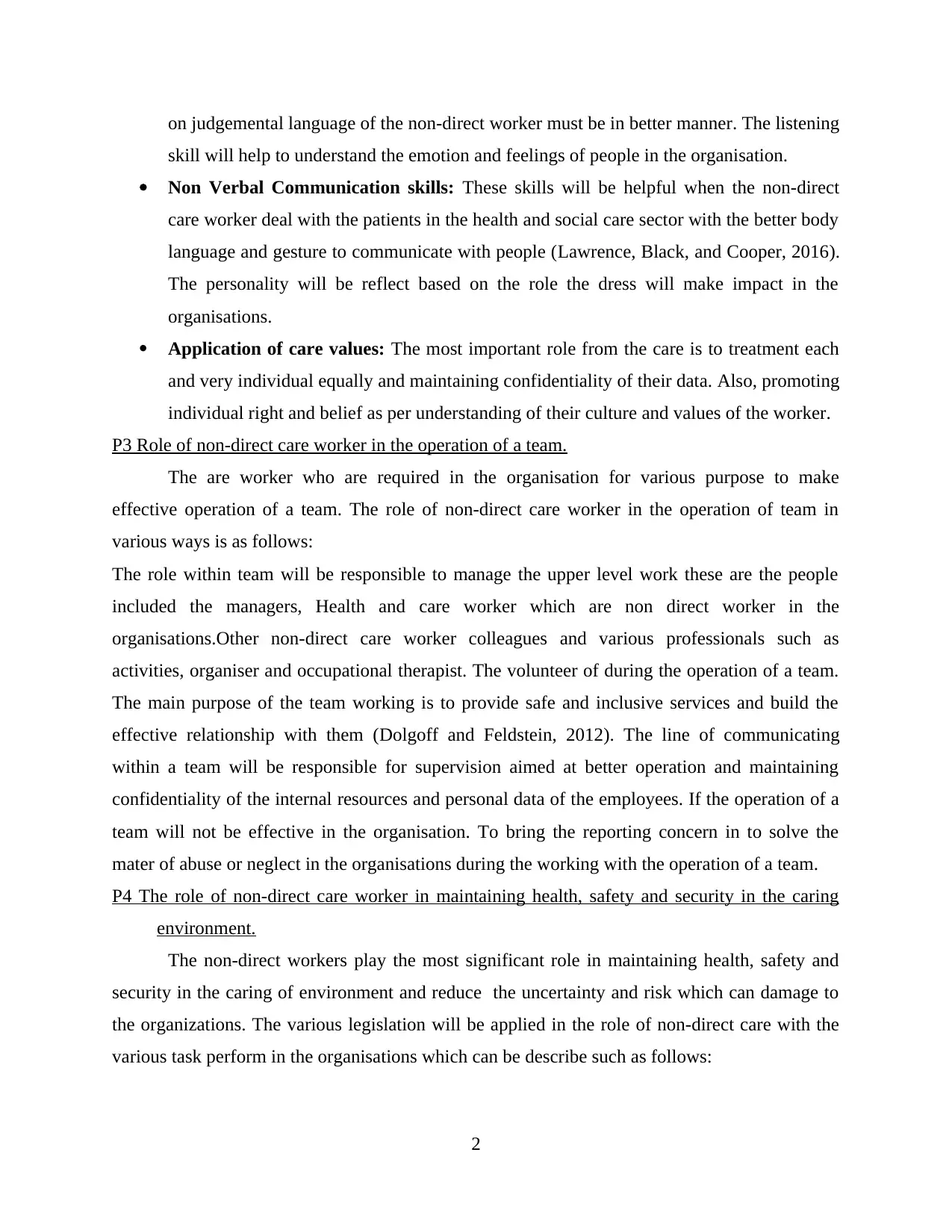
on judgemental language of the non-direct worker must be in better manner. The listening
skill will help to understand the emotion and feelings of people in the organisation.
Non Verbal Communication skills: These skills will be helpful when the non-direct
care worker deal with the patients in the health and social care sector with the better body
language and gesture to communicate with people (Lawrence, Black, and Cooper, 2016).
The personality will be reflect based on the role the dress will make impact in the
organisations.
Application of care values: The most important role from the care is to treatment each
and very individual equally and maintaining confidentiality of their data. Also, promoting
individual right and belief as per understanding of their culture and values of the worker.
P3 Role of non-direct care worker in the operation of a team.
The are worker who are required in the organisation for various purpose to make
effective operation of a team. The role of non-direct care worker in the operation of team in
various ways is as follows:
The role within team will be responsible to manage the upper level work these are the people
included the managers, Health and care worker which are non direct worker in the
organisations.Other non-direct care worker colleagues and various professionals such as
activities, organiser and occupational therapist. The volunteer of during the operation of a team.
The main purpose of the team working is to provide safe and inclusive services and build the
effective relationship with them (Dolgoff and Feldstein, 2012). The line of communicating
within a team will be responsible for supervision aimed at better operation and maintaining
confidentiality of the internal resources and personal data of the employees. If the operation of a
team will not be effective in the organisation. To bring the reporting concern in to solve the
mater of abuse or neglect in the organisations during the working with the operation of a team.
P4 The role of non-direct care worker in maintaining health, safety and security in the caring
environment.
The non-direct workers play the most significant role in maintaining health, safety and
security in the caring of environment and reduce the uncertainty and risk which can damage to
the organizations. The various legislation will be applied in the role of non-direct care with the
various task perform in the organisations which can be describe such as follows:
2
skill will help to understand the emotion and feelings of people in the organisation.
Non Verbal Communication skills: These skills will be helpful when the non-direct
care worker deal with the patients in the health and social care sector with the better body
language and gesture to communicate with people (Lawrence, Black, and Cooper, 2016).
The personality will be reflect based on the role the dress will make impact in the
organisations.
Application of care values: The most important role from the care is to treatment each
and very individual equally and maintaining confidentiality of their data. Also, promoting
individual right and belief as per understanding of their culture and values of the worker.
P3 Role of non-direct care worker in the operation of a team.
The are worker who are required in the organisation for various purpose to make
effective operation of a team. The role of non-direct care worker in the operation of team in
various ways is as follows:
The role within team will be responsible to manage the upper level work these are the people
included the managers, Health and care worker which are non direct worker in the
organisations.Other non-direct care worker colleagues and various professionals such as
activities, organiser and occupational therapist. The volunteer of during the operation of a team.
The main purpose of the team working is to provide safe and inclusive services and build the
effective relationship with them (Dolgoff and Feldstein, 2012). The line of communicating
within a team will be responsible for supervision aimed at better operation and maintaining
confidentiality of the internal resources and personal data of the employees. If the operation of a
team will not be effective in the organisation. To bring the reporting concern in to solve the
mater of abuse or neglect in the organisations during the working with the operation of a team.
P4 The role of non-direct care worker in maintaining health, safety and security in the caring
environment.
The non-direct workers play the most significant role in maintaining health, safety and
security in the caring of environment and reduce the uncertainty and risk which can damage to
the organizations. The various legislation will be applied in the role of non-direct care with the
various task perform in the organisations which can be describe such as follows:
2
Paraphrase This Document
Need a fresh take? Get an instant paraphrase of this document with our AI Paraphraser
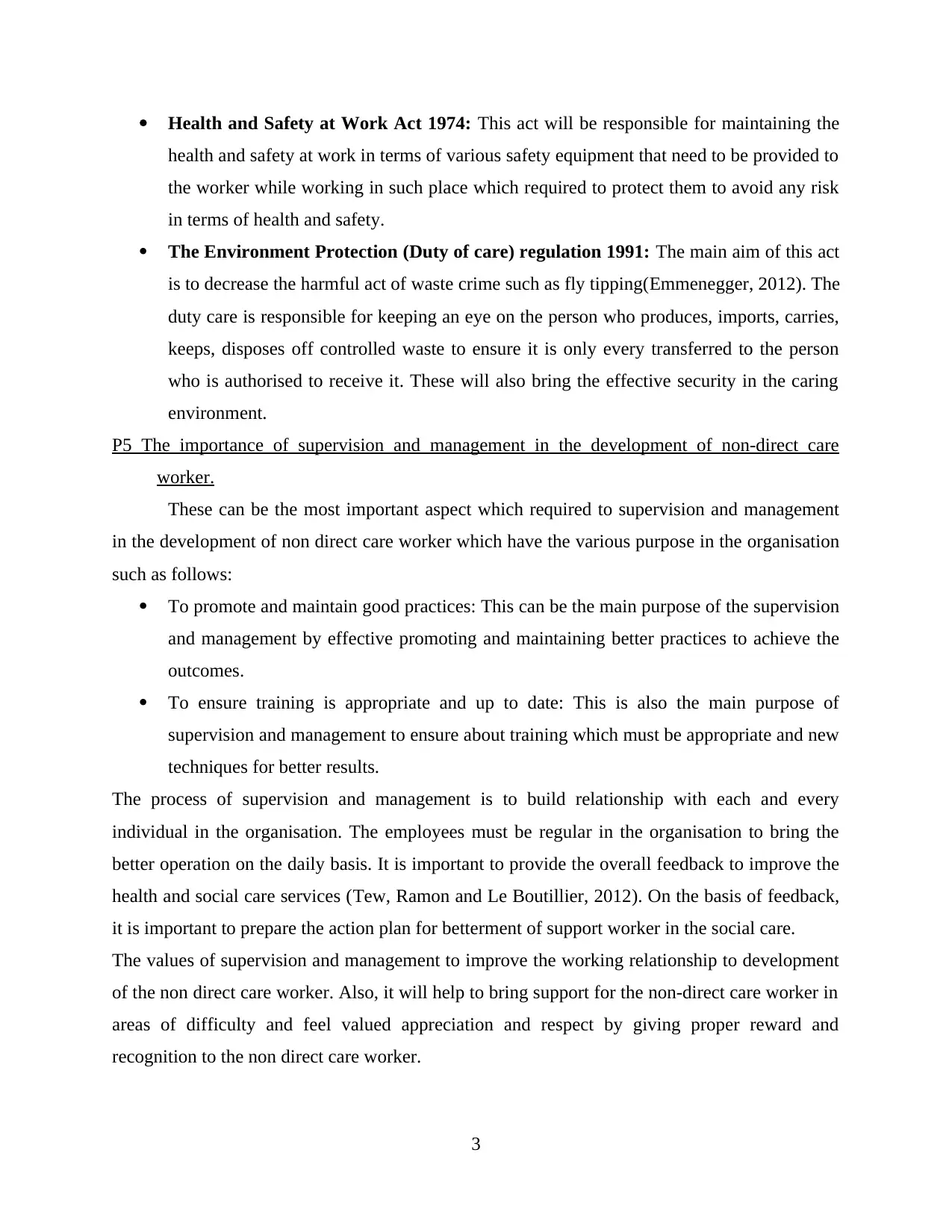
Health and Safety at Work Act 1974: This act will be responsible for maintaining the
health and safety at work in terms of various safety equipment that need to be provided to
the worker while working in such place which required to protect them to avoid any risk
in terms of health and safety.
The Environment Protection (Duty of care) regulation 1991: The main aim of this act
is to decrease the harmful act of waste crime such as fly tipping(Emmenegger, 2012). The
duty care is responsible for keeping an eye on the person who produces, imports, carries,
keeps, disposes off controlled waste to ensure it is only every transferred to the person
who is authorised to receive it. These will also bring the effective security in the caring
environment.
P5 The importance of supervision and management in the development of non-direct care
worker.
These can be the most important aspect which required to supervision and management
in the development of non direct care worker which have the various purpose in the organisation
such as follows:
To promote and maintain good practices: This can be the main purpose of the supervision
and management by effective promoting and maintaining better practices to achieve the
outcomes.
To ensure training is appropriate and up to date: This is also the main purpose of
supervision and management to ensure about training which must be appropriate and new
techniques for better results.
The process of supervision and management is to build relationship with each and every
individual in the organisation. The employees must be regular in the organisation to bring the
better operation on the daily basis. It is important to provide the overall feedback to improve the
health and social care services (Tew, Ramon and Le Boutillier, 2012). On the basis of feedback,
it is important to prepare the action plan for betterment of support worker in the social care.
The values of supervision and management to improve the working relationship to development
of the non direct care worker. Also, it will help to bring support for the non-direct care worker in
areas of difficulty and feel valued appreciation and respect by giving proper reward and
recognition to the non direct care worker.
3
health and safety at work in terms of various safety equipment that need to be provided to
the worker while working in such place which required to protect them to avoid any risk
in terms of health and safety.
The Environment Protection (Duty of care) regulation 1991: The main aim of this act
is to decrease the harmful act of waste crime such as fly tipping(Emmenegger, 2012). The
duty care is responsible for keeping an eye on the person who produces, imports, carries,
keeps, disposes off controlled waste to ensure it is only every transferred to the person
who is authorised to receive it. These will also bring the effective security in the caring
environment.
P5 The importance of supervision and management in the development of non-direct care
worker.
These can be the most important aspect which required to supervision and management
in the development of non direct care worker which have the various purpose in the organisation
such as follows:
To promote and maintain good practices: This can be the main purpose of the supervision
and management by effective promoting and maintaining better practices to achieve the
outcomes.
To ensure training is appropriate and up to date: This is also the main purpose of
supervision and management to ensure about training which must be appropriate and new
techniques for better results.
The process of supervision and management is to build relationship with each and every
individual in the organisation. The employees must be regular in the organisation to bring the
better operation on the daily basis. It is important to provide the overall feedback to improve the
health and social care services (Tew, Ramon and Le Boutillier, 2012). On the basis of feedback,
it is important to prepare the action plan for betterment of support worker in the social care.
The values of supervision and management to improve the working relationship to development
of the non direct care worker. Also, it will help to bring support for the non-direct care worker in
areas of difficulty and feel valued appreciation and respect by giving proper reward and
recognition to the non direct care worker.
3
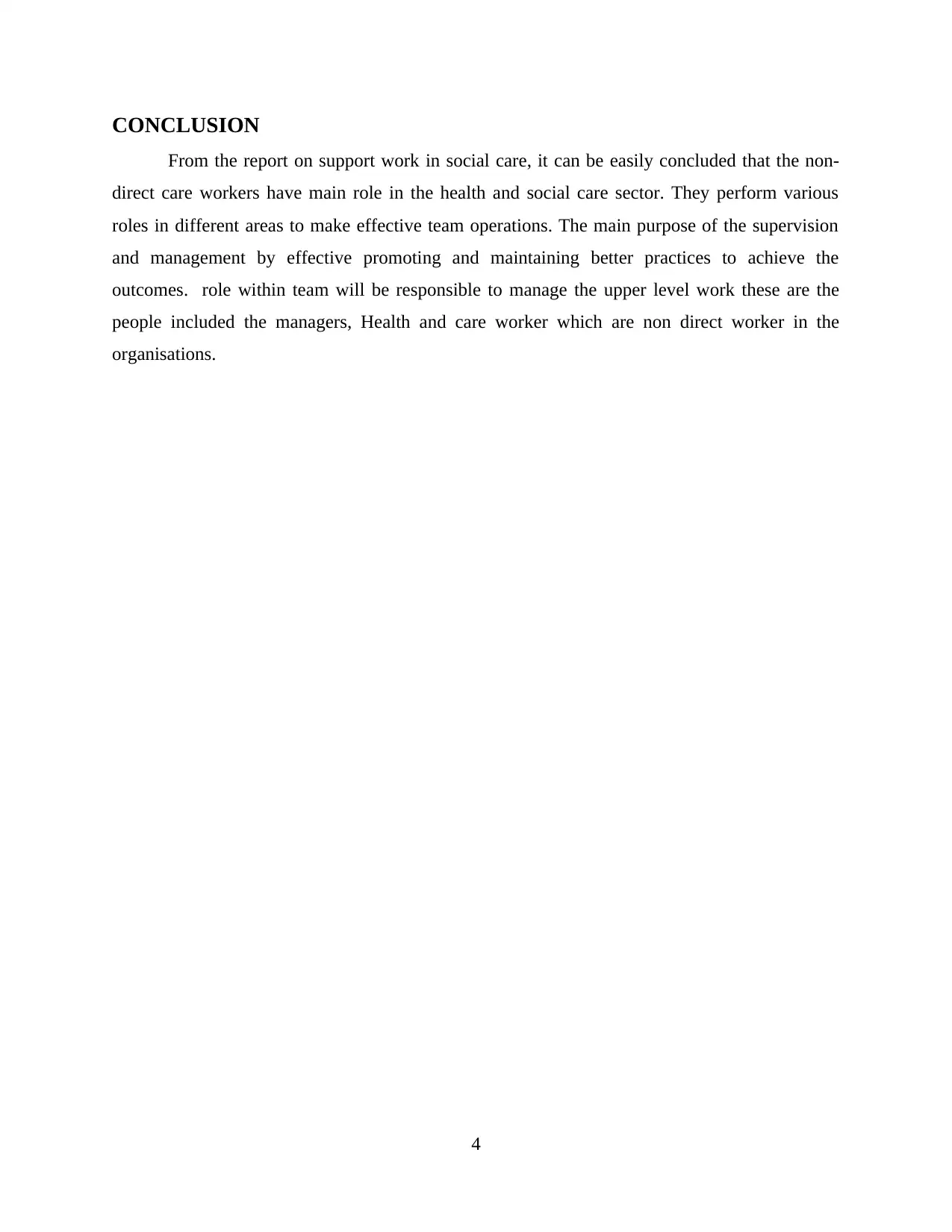
CONCLUSION
From the report on support work in social care, it can be easily concluded that the non-
direct care workers have main role in the health and social care sector. They perform various
roles in different areas to make effective team operations. The main purpose of the supervision
and management by effective promoting and maintaining better practices to achieve the
outcomes. role within team will be responsible to manage the upper level work these are the
people included the managers, Health and care worker which are non direct worker in the
organisations.
4
From the report on support work in social care, it can be easily concluded that the non-
direct care workers have main role in the health and social care sector. They perform various
roles in different areas to make effective team operations. The main purpose of the supervision
and management by effective promoting and maintaining better practices to achieve the
outcomes. role within team will be responsible to manage the upper level work these are the
people included the managers, Health and care worker which are non direct worker in the
organisations.
4
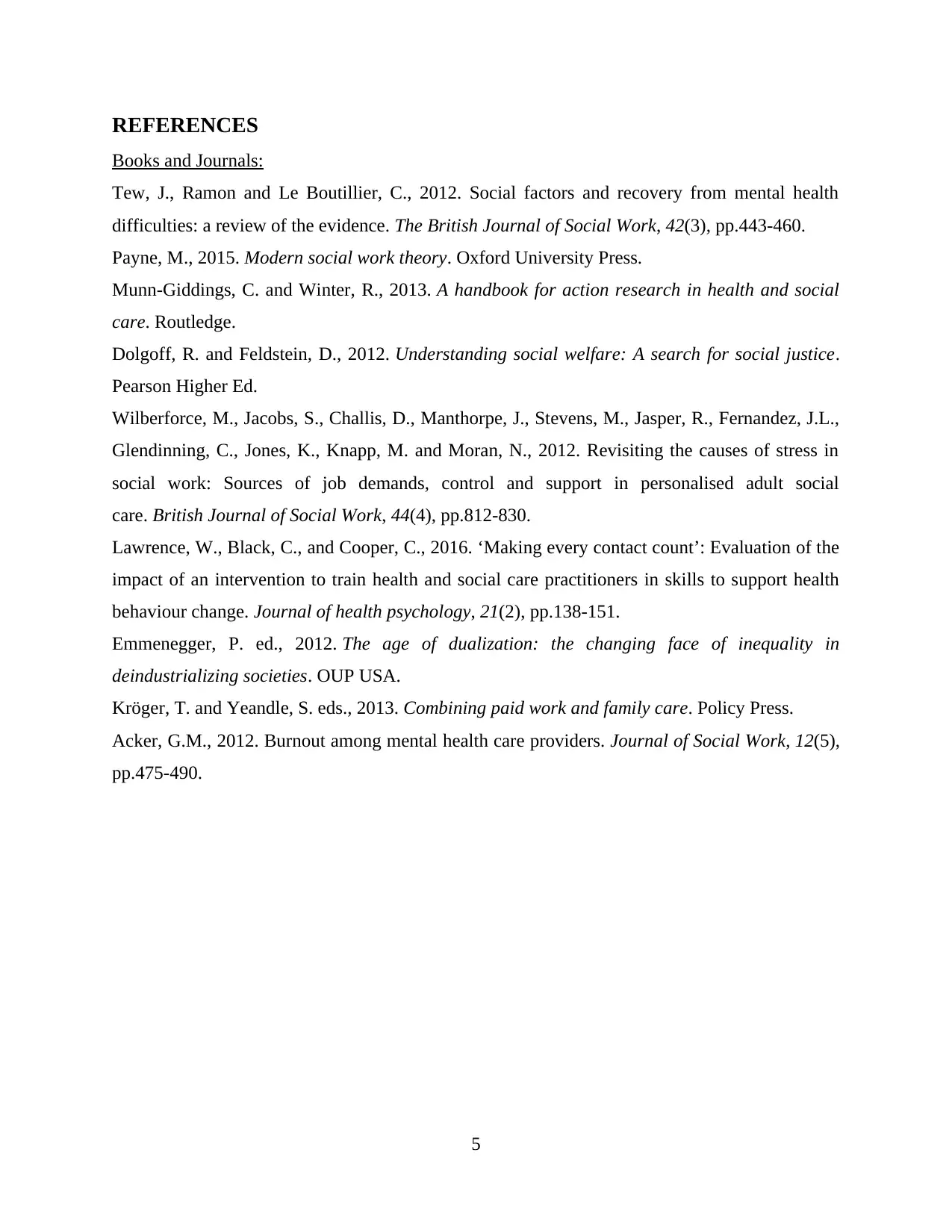
REFERENCES
Books and Journals:
Tew, J., Ramon and Le Boutillier, C., 2012. Social factors and recovery from mental health
difficulties: a review of the evidence. The British Journal of Social Work, 42(3), pp.443-460.
Payne, M., 2015. Modern social work theory. Oxford University Press.
Munn-Giddings, C. and Winter, R., 2013. A handbook for action research in health and social
care. Routledge.
Dolgoff, R. and Feldstein, D., 2012. Understanding social welfare: A search for social justice.
Pearson Higher Ed.
Wilberforce, M., Jacobs, S., Challis, D., Manthorpe, J., Stevens, M., Jasper, R., Fernandez, J.L.,
Glendinning, C., Jones, K., Knapp, M. and Moran, N., 2012. Revisiting the causes of stress in
social work: Sources of job demands, control and support in personalised adult social
care. British Journal of Social Work, 44(4), pp.812-830.
Lawrence, W., Black, C., and Cooper, C., 2016. ‘Making every contact count’: Evaluation of the
impact of an intervention to train health and social care practitioners in skills to support health
behaviour change. Journal of health psychology, 21(2), pp.138-151.
Emmenegger, P. ed., 2012. The age of dualization: the changing face of inequality in
deindustrializing societies. OUP USA.
Kröger, T. and Yeandle, S. eds., 2013. Combining paid work and family care. Policy Press.
Acker, G.M., 2012. Burnout among mental health care providers. Journal of Social Work, 12(5),
pp.475-490.
5
Books and Journals:
Tew, J., Ramon and Le Boutillier, C., 2012. Social factors and recovery from mental health
difficulties: a review of the evidence. The British Journal of Social Work, 42(3), pp.443-460.
Payne, M., 2015. Modern social work theory. Oxford University Press.
Munn-Giddings, C. and Winter, R., 2013. A handbook for action research in health and social
care. Routledge.
Dolgoff, R. and Feldstein, D., 2012. Understanding social welfare: A search for social justice.
Pearson Higher Ed.
Wilberforce, M., Jacobs, S., Challis, D., Manthorpe, J., Stevens, M., Jasper, R., Fernandez, J.L.,
Glendinning, C., Jones, K., Knapp, M. and Moran, N., 2012. Revisiting the causes of stress in
social work: Sources of job demands, control and support in personalised adult social
care. British Journal of Social Work, 44(4), pp.812-830.
Lawrence, W., Black, C., and Cooper, C., 2016. ‘Making every contact count’: Evaluation of the
impact of an intervention to train health and social care practitioners in skills to support health
behaviour change. Journal of health psychology, 21(2), pp.138-151.
Emmenegger, P. ed., 2012. The age of dualization: the changing face of inequality in
deindustrializing societies. OUP USA.
Kröger, T. and Yeandle, S. eds., 2013. Combining paid work and family care. Policy Press.
Acker, G.M., 2012. Burnout among mental health care providers. Journal of Social Work, 12(5),
pp.475-490.
5
1 out of 7
Related Documents
Your All-in-One AI-Powered Toolkit for Academic Success.
+13062052269
info@desklib.com
Available 24*7 on WhatsApp / Email
![[object Object]](/_next/static/media/star-bottom.7253800d.svg)
Unlock your academic potential
© 2024 | Zucol Services PVT LTD | All rights reserved.





